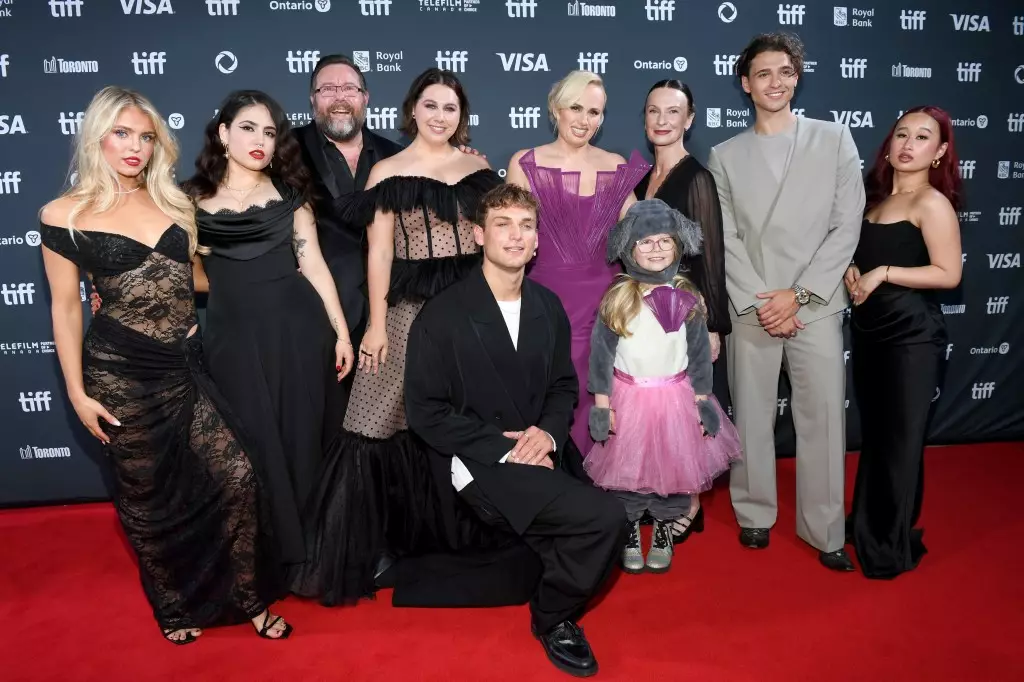The entertainment industry, often illuminated by gala events and glamorous red carpets, can sometimes cast shadows that hide troubling truths. Rebel Wilson’s recent legal maneuvers serve as a stark reminder of the undercurrents of misconduct that can exist behind the scenes. After months of rising tensions, the Pitch Perfect actress has formally responded with a counter-lawsuit against the producers of her film, The Deb. What began as a battle of words has escalated into a major legal confrontation featuring allegations of misconduct, deception, and an overall toxic environment that requires examination.
The simmering conflict reached a boiling point shortly after the world premiere of The Deb at the Toronto Film Festival. Wilson, who took on multiple roles in the film as its director and lead actress, alleged that producers Amanda Ghost, Gregor Cameron, and Vince Holden engaged in “egregious and illicit behaviors.” These serious claims include theft, bullying, and even sexual misconduct. Such heavy accusations cast a long shadow over the film’s production and were not dismissed lightly. The intricacies of this case unravel as one dives into the details of Wilson’s counter-complaint filed on September 26, which paints a picture of an industry where such misconduct can too easily go unreported and unpunished.
The heart of Wilson’s suit lies in her assertions that these producers operated under the misguided notion that they were untouchable, free to act without regard for their moral or legal obligations. Her counter-complaint doesn’t just seek redress for personal grievances but stands as a clarion call for all those who have faced similar exploitation. Wilson’s determination to root out the underlying issues speaks volumes about the need for accountability in the entertainment industry.
The events leading up to the counter-complaint are as tumultuous as the allegations themselves. Initial confrontations occurred in the summer when Wilson went public with her criticisms of the producers, accusing them of undermining not only the film’s integrity but also the safety and well-being of its cast. In response, the trio quickly pivoted to a legal strategy that involved filing a defamation lawsuit against Wilson, illustrating the increasing stakes and complexities inherent in their disagreements.
Wilson’s legal team, led by the assertive Bryan Freedman, seems poised not only to defend her reputation but also to disclose a troubling pattern of exploitation within the industry. Freedman’s assertion that “only a fraction of their outrageous conduct has been revealed thus far” suggests more unflattering discoveries could emerge in the coming weeks. In a world where the voices of marginally known actresses often go unheard, Wilson’s commitment to shine a light on these issues could serve as a crucial turning point.
The ramifications of this legal struggle extend beyond just Wilson and the implicated producers; they resonate throughout Hollywood, a place long criticized for its ability to shield wrongdoers. Wilson’s counter-lawsuit is a critical component of broader discussions concerning the moral responsibilities of those in power, particularly in a workplace as scrutinized as the film industry. If Wilson’s claims gain traction, they could compel other individuals who have suffered in silence to step forward, advocating for a necessary shift towards transparency and accountability.
The ongoing nature of this conflict indicates that the entertainment industry must reckon with its troubling history of misconduct. Wilson’s case exemplifies the importance of not only speaking out against wrongdoing but also taking decisive action against it. With more individuals willing to reveal their stories, the conversations surrounding workplace ethics and accountability are likely to intensify, making it increasingly difficult for toxic behavior to persist without consequence.
Rebel Wilson’s legal battle is far from an isolated incident; it reflects a growing awareness of the need for systemic change within the entertainment industry. By standing up against those who think they can act without accountability, Wilson not only advocates for herself but also champions countless others who have faced similar challenges. As this saga continues to unfold, all eyes will undoubtedly be on how it reshapes the narrative surrounding conduct and ethics in Hollywood. The outcomes, whether a resolution or further confrontation, will have lasting implications that could potentially send ripples throughout the entire industry, prompting a re-evaluation of how power dynamics play out behind the camera.

